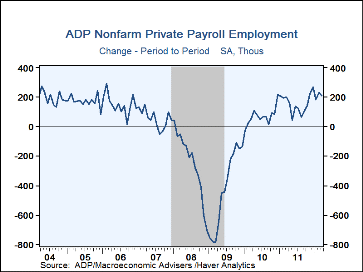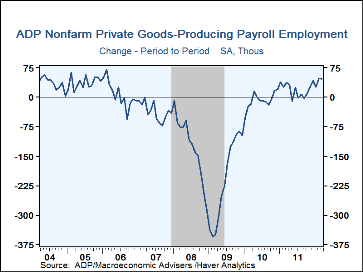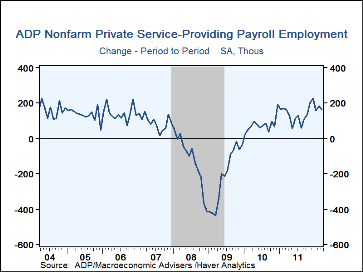 Global| Apr 04 2012
Global| Apr 04 2012ADP Report Estimates Payrolls Rise 209,000
by:Tom Moeller
|in:Economy in Brief
Summary
Employment growth is continuing at a moderate rate. That's indicated by the 209,000 increase in March private-sector payrolls reported by the payroll processor Automatic Data Processing (ADP) and economic consultants Macroeconomic [...]
 Employment growth is continuing at a moderate
rate. That's indicated by the 209,000 increase in March
private-sector payrolls reported by
the payroll processor Automatic Data
Processing (ADP) and economic consultants Macroeconomic Advisers.
The increase followed a 230,000 February
gain and a 182,000 January rise, last month shown as
216,000 and 173,000, respectively. The latest increase roughly
matched Consensus expectations for a 205,000 gain. It left three-month growth at
2.3% (AR).
Employment growth is continuing at a moderate
rate. That's indicated by the 209,000 increase in March
private-sector payrolls reported by
the payroll processor Automatic Data
Processing (ADP) and economic consultants Macroeconomic Advisers.
The increase followed a 230,000 February
gain and a 182,000 January rise, last month shown as
216,000 and 173,000, respectively. The latest increase roughly
matched Consensus expectations for a 205,000 gain. It left three-month growth at
2.3% (AR).
The U.S. Bureau of Labor Statistics will report March payroll employment on Friday. Economists expect a 222,000 worker increase in private sector jobs. By comparison, the February increase of 230,000 in ADP's measure of private nonfarm payrolls was accompanied by a 233,000 gain in the BLS measure of private sector jobs. According to ADP and Macro-Advisers, the correlation between the monthly percentage change in the ADP figure and the BLS data is 0.90. ADP compiles its estimate from its database of individual companies' payroll information. Macroeconomic Advisers, LLC, the St. Louis economic consulting firm, developed the methodology for transforming the raw data into an economic indicator.
The service sector again led job growth. Its 164,000 worker gain (1.8% y/y) was accompanied by a 45,000 increase (1.3% y/y) in goods-producing payrolls. Factory sector jobs rose 23,000 (0.9% y/y). Overall, small-sized payrolls again showed the greatest improvement with a 100,000 (1.9% y/y) gain. Medium-sized payrolls followed with an 87,000 (2.0% y/y) increase while large payrolls grew 22,000 (0.6% y/y). Construction employment added 13,000 and the number of financial activities jobs rose a lessened 8,000.
The ADP National Employment Report data is maintained in Haver's USECON database; historical figures date back to December 2000. The figures in this report cover only private sector jobs and exclude employment in the public sector. The ADP methodology is explained here. The expectations figures are available in Haver's AS1REPNA database.
| ADP National Employment Report | Mar | Feb | Jan | Y/Y | 2011 | 2010 | 2009 |
|---|---|---|---|---|---|---|---|
| Nonfarm Private Payroll Employment (m/m Chg., 000s) | 209 | 230 | 182 | 1.7% | 1.4% | -1.0% | -4.1% |
| Small Payroll (1-49) | 100 | 113 | 97 | 1.9 | 1.4 | -0.9 | -4.1 |
| Medium Payroll (50-499) | 87 | 95 | 78 | 2.0 | 1.8 | -0.9 | -5.7 |
| Large Payroll (>500) | 22 | 22 | 7 | 0.6 | 0.4 | -1.8 | -5.6 |
| Goods Producing | 45 | 47 | 26 | 1.3 | 0.8 | -4.8 | -12.4 |
| Manufacturing | 23 | 24 | 18 | 0.9 | 1.3 | -3.2 | -11.4 |
| Service Producing | 164 | 183 | 156 | 1.8 | 1.5 | -0.2 | -3.2 |
Tom Moeller
AuthorMore in Author Profile »Prior to joining Haver Analytics in 2000, Mr. Moeller worked as the Economist at Chancellor Capital Management from 1985 to 1999. There, he developed comprehensive economic forecasts and interpreted economic data for equity and fixed income portfolio managers. Also at Chancellor, Mr. Moeller worked as an equity analyst and was responsible for researching and rating companies in the economically sensitive automobile and housing industries for investment in Chancellor’s equity portfolio. Prior to joining Chancellor, Mr. Moeller was an Economist at Citibank from 1979 to 1984. He also analyzed pricing behavior in the metals industry for the Council on Wage and Price Stability in Washington, D.C. In 1999, Mr. Moeller received the award for most accurate forecast from the Forecasters' Club of New York. From 1990 to 1992 he was President of the New York Association for Business Economists. Mr. Moeller earned an M.B.A. in Finance from Fordham University, where he graduated in 1987. He holds a Bachelor of Arts in Economics from George Washington University.
More Economy in Brief
 Global| Feb 05 2026
Global| Feb 05 2026Charts of the Week: Balanced Policy, Resilient Data and AI Narratives
by:Andrew Cates








